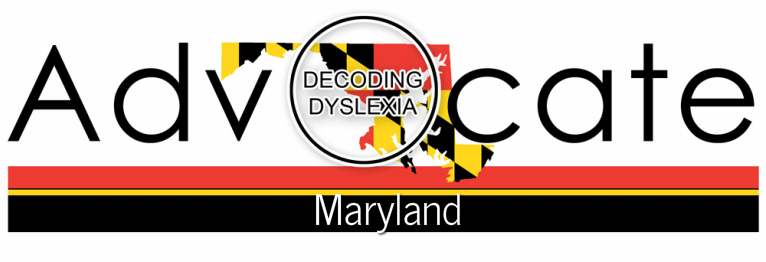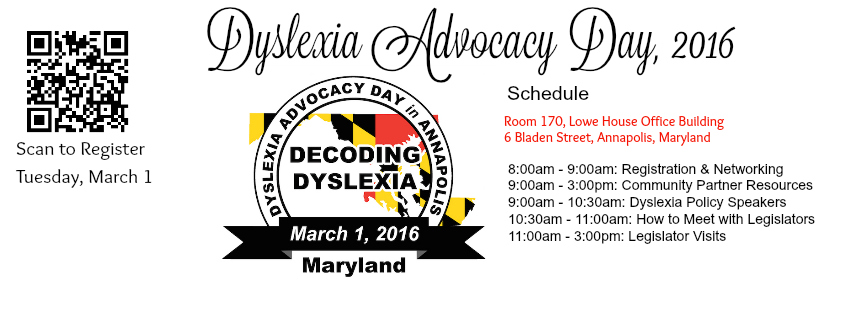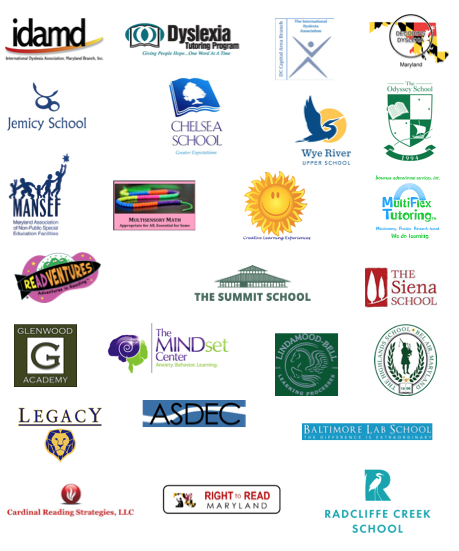Thank you to the families, teachers and related professionals who joined Decoding Dyslexia Maryland in Annapolis on March 1 to raise dyslexia awareness and to advocate for interventions and supports for students with dyslexia in Maryland. Maryland families, students and teachers visited their legislators and asked for specific changes to Maryland education.
The program guide below will be updated with links to the presentation slides and video footage of the presentations.
The program guide below will be updated with links to the presentation slides and video footage of the presentations.
| Room 170, Lowe House of Delegates Office Building PROGRAM
| Reading Experts Convene in Annapolis with Goal to Close the Reading Gap MSDE says the term “dyslexia” should be used to drive instruction Annapolis (March 4, 2016) - On Tuesday, March 1, Maryland education leaders, education advocates, literacy experts, teachers, parents and students joined with Decoding Dyslexia Maryland (DD-MD) to build partnerships and lay the foundation to close the reading gap in Maryland. With 60% of Maryland 3rd, 4th and 5th graders considered below grade level in reading, the majority of Maryland students are NOT “college and career ready.” Hosted by Decoding Dyslexia Maryland (DD-MD) and Community Partners, Dyslexia Advocacy Day brought together experts from across the state to educate legislators on what is happening in our public schools, and to move literacy solutions forward. “We know that children with dyslexia are not well-served by our public schools. They need structured literacy, a direct approach to reading instruction that is evidence-based and proven to work for students at risk for reading failure and dyslexia. Structured literacy can help 95% of children learn to read,” said Laura Schultz, State Leader of Decoding Dyslexia Maryland and a member of the Dyslexia Education Task Force. Keynote speaker Elisabeth Liptak, Director of the Center for Effective Reading Instruction (CERI) in Towson, Maryland addressed the need to provide teachers with structured literacy coursework. “We believe that teachers need a thorough grounding in the structure of language in order to teach reading effectively,” said Liptak. The CERI announced its plans for teacher education and three teacher certification levels. Certification requirements include a Certification Exam for Educators of Reading which measures an educator’s knowledge of Structured Literacy Instruction and was developed with the input of 1,200 educators. She added, “Teacher training is both the challenge and the opportunity.” Marcella Franczkowski, Assistant State Superintendent for Special Education & Early Intervention Services with the Maryland State Department of Education (MSDE), who also serves on the Dyslexia Education Task Force, shared how the recent U.S. Department of Education Dear Colleague Guidance letter on Dyslexia, Dysgraphia and Dyscalculia focused the state on dyslexia. “In this October Guidance Letter, states received clear guidance about the use of the terms dyslexia, dyscalculia and dysgraphia…. We are unpacking this Federal Guidance to ensure that Maryland is aligned, and that Maryland will be supporting all student challenges, including our students with dyslexia.” She added “There is no prohibition to use the terms dysgraphia, dyscalculia and dyslexia in the IEP team process and we would especially want to use this word, not as a term or as a label, but as one that drives instructional decisions.” The Maryland teachers union supports efforts to change education to better serve students at risk for reading failure and dyslexia. Speaker Betty Weller, President, Maryland State Education Association (MSEA) said, “I spent 32 years in the 7th grade….and I never saw a student that I could point out as having dyslexia, because nobody ever taught me how to do that. As an English teacher I know the importance of good reading. Recent research will tell you that if children don’t get off to a good start in reading, they are never going to catch up, so it’s critical that we make sure that happens. The best solution for that is early identification….not third grade, not fifth grade but pre-k, kindergarten and first grade.” The Dyslexia Education Task Force members were chosen by legislative and gubernatorial appointment and include education leaders, teachers and dyslexia advocates. The Task Force will make recommendations to implement a dyslexia pilot program for public school districts in Maryland, which will include best practices for early identification and teacher education in reading instruction. DD-MD parents and teachers spent the afternoon meeting with legislators who were asked to support House Bill 895 to extend the Task Force for up to one year. “We know what works and we have a dream team of people who are volunteering to put together a program that meets the needs of diverse, struggling and at-risk readers, including students with dyslexia. We need to make sure that all the elements are in place and are scalable to public school classrooms across the state,” said Lisa Blottenberger, Member of the Dyslexia Education Task Force and Co-Founder of Decoding Dyslexia Maryland. “We have so much support, so much evidence and so many families who are depending on us to get this right. I am confident that Maryland is moving in the right direction.” |
What You Need to Know for Dyslexia Advocacy Day, 2016
Make appointments with your legislators in advance
Parking: Gott’s Garage, 2 blocks away
All Parking Garages
Navy-Marine Corps Stadium parking and shuttle (parking $5 a day, shuttle $4 round trip, cash only)
Wear Red!
Parking: Gott’s Garage, 2 blocks away
All Parking Garages
Navy-Marine Corps Stadium parking and shuttle (parking $5 a day, shuttle $4 round trip, cash only)
Wear Red!
Dyslexia Advocacy Day, Community Partner Sponsors
Please visit our sponsors from 8-9am and after 11am during your down time between legislative visits
Atlantic Seaboard Dyslexia Education Center (ASDEC)
Baltimore Lab School
bowman educational services, inc.
Cardinal Reading Strategies
Chelsea School
Creative Learning Experiences
D.C. Capital Area Branch, International Dyslexia Association (DCIDA)
Dyslexia Tutoring Program
Glenwood Academy
Jemicy School
International Dyslexia Association, Maryland Branch (IDAMD)
Lindamood-Bell Learning Centers
Maryland Association of Nonpublic Special Education Facilities (MANSEF)
MINDset Center
Multisensory Math
Radcliffe Creek School
Readventures
Right To Read Maryland
The Highlands School
The Legacy School
The Odyssey School
The Siena School
The Summit School
Wye River Upper School



 RSS Feed
RSS Feed